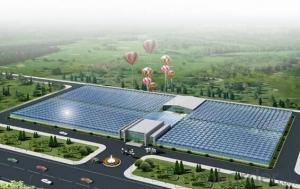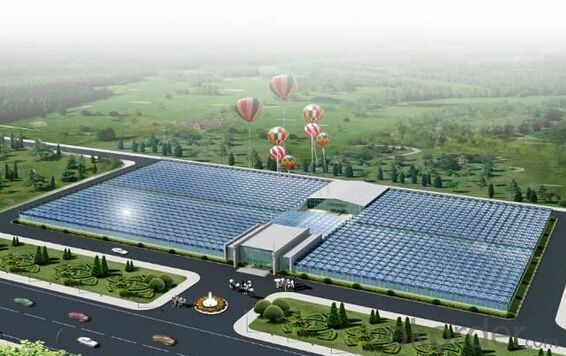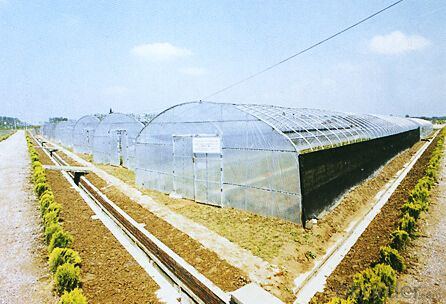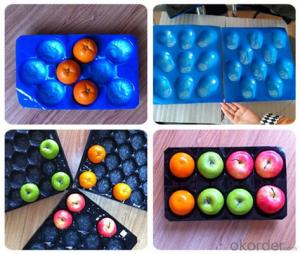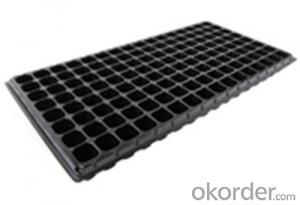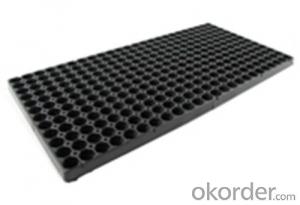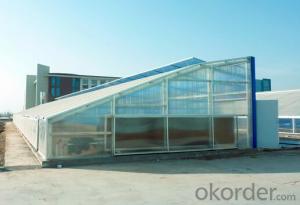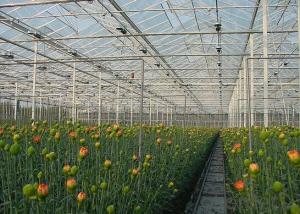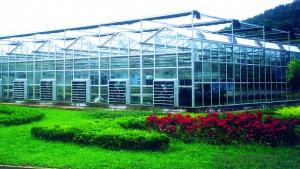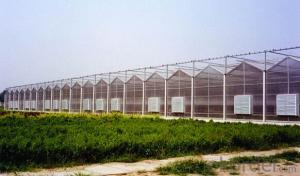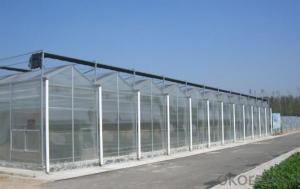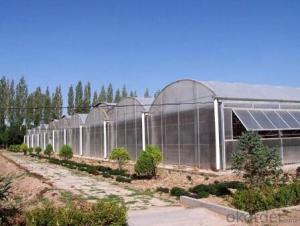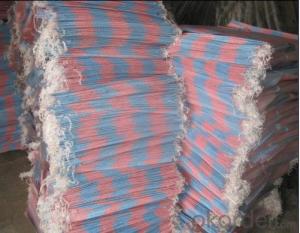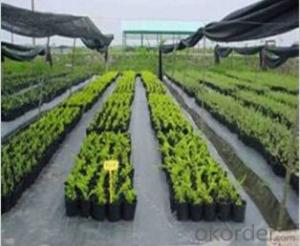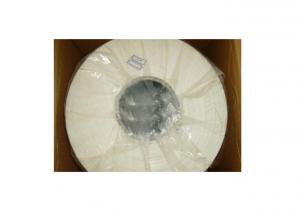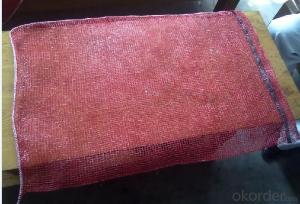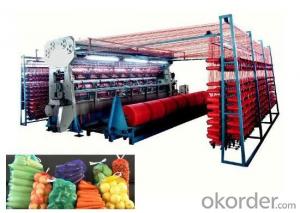Glass sheet Greenhouses for Study or Plants Grow
- Loading Port:
- Shanghai
- Payment Terms:
- TT OR LC
- Min Order Qty:
- 10 set
- Supply Capability:
- 10000 set/month
OKorder Service Pledge
OKorder Financial Service
You Might Also Like
Greenhouse Introduction:
Greenhouse for vegetable,eco-restaurant,flower market,luxury flower plantting,seed nursery
1.Framework: Double side hot galvanized steel.
2.Covering Material: One layer glass or two-layer glass.
3.Door: Sliding door,Aluminum alloy framework covered by glass.
Specifications
1. Greenhouse (Kingpeng brand)
2. ISO 9000/9001/9004/19011:2000
3. Double side hot galvanized steel
4. Good reputation
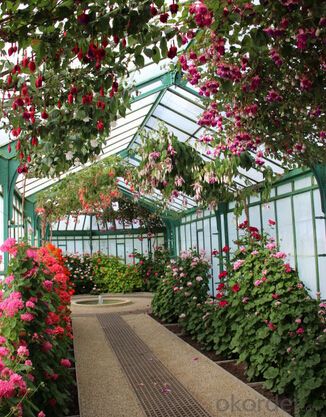
Greenhouse Feature:
1. Intellectual control system keep suitable humidity,temperature,light and so on.
2. Steady high light transmission and good ventilation.
3. Main structure 25 years life time.
4. Many patent rights in greenhouse field.
5. Professional R&D center guarantee top quality.
6. Design according to customers' local climate condition.
7. Good after-service: could send engineer go abroad for correct installation.
8. Popular in the world
FAQ:
1. What's the delivery time?
About 30 days.Or according special condition to short.
2. What is the shipping way?
It depands on yours. We usually ship Port of Qingdao Port.
3. Can you design for us?
Yes. We have a professional team having rich experience in greenhouse design and manufacturing. Just tell us your ideas and we will help to carry out your ideas into perfect greenhouse. It does not matter if you do not have someone to complete files. Send us high resolution images, your Logo and text and tell us how you would like to arrange them. We will send you finished files for confirmation.
- Q: This question asks for an overview of the various kinds of agricultural plastic products that can decompose naturally over time.
- <p>Biodegradable agricultural plastic products are designed to reduce environmental impact by decomposing after use. Some common types include: 1) Biodegradable mulch films, used to cover soil and control weeds; 2) Compostable pots and trays, which break down in compost heaps; 3) Biodegradable greenhouse films, offering protection similar to traditional plastics but breaking down at the end of their lifecycle; 4) Biodegradable nets and covers, used for crop protection and to support climbing plants; 5) Biodegradable twine and ties, used for securing plants and securing nets; and 6) Biodegradable seed tapes, which allow seeds to be planted in a controlled manner and the tape to decompose after use. These products are made from materials like PLA (polylactic acid), PHA (polyhydroxyalkanoates), and starch blends, which can break down under certain conditions.</p>
- Q: Is recycling plastic difficult? I was at Lowe's the other day, and they had a recycled plastic tote. It was half the price of the same size non-recycled tote. I thought about buying it, but the texture was rough and sand papery, and there was this noxious odor emanating from it that actually made me cough a few times (I wasn't being dramatic, I was alone.) So in my head I thought to myself, is recycled plastic actually difficult to produce into a tolerable product, or are the big plastic companies trying to make me think this to make me shy away from recyclables, because both totes were made from the same manufacturer.
- In general it is easy and inexpensive to recycle plastic. Your experience with the tote is strange and I wonder what was really being sold? To recycle plastic it is separated by type. PE. PP,PET and PETG are the most common packaging materials. Next comes the hardest part, which is removing all the labels and residues. Once the plastic is clean you just grind it into little bits and melt it to form pellets that can be melted and formed into new stuff. The amount of energy to do this is minimal. The plastic is not quite as strong, and cannot be made white or clear, but it is fine for many uses. These totes sound strange. Why would they have the rough texture, and the odor indicating a volatile outgassing? Plastics used for packaging do not outgas. Perhaps some new process that uses glue to bind dissimilar plastics? Best to leave those on the shelf.
- Q: How are plastic fruit picking poles used in orchards?
- Plastic fruit picking poles are used in orchards to reach and harvest fruits that are high up on the trees. These poles usually have a flexible yet sturdy plastic rod with a hook or basket attachment at the end. By extending the pole, fruit pickers can safely grab and gently detach ripe fruits without damaging the tree branches or using ladders. The lightweight and durable nature of plastic poles make them efficient tools for efficient fruit harvesting in orchards.
- Q: What are the different types of plastic clips used in horticulture?
- There are several types of plastic clips commonly used in horticulture, including plant clips, trellis clips, and twist ties. Plant clips are used to secure plants to stakes or trellises, providing support as they grow. Trellis clips are specifically designed to attach plants to trellises or wire frames, ensuring they remain upright and properly trained. Twist ties are flexible plastic strips with a wire core, often used to secure plants to stakes or to bundle and organize garden materials. These plastic clips are essential tools in horticulture, helping to promote healthy plant growth and organization in gardens and nurseries.
- Q: Can nursery trays be used for starting plants for botanical gardens?
- Yes, nursery trays can be used for starting plants for botanical gardens. Nursery trays provide a convenient and organized way to start and nurture plants, allowing for efficient growth and transplantation. They are commonly used in the horticultural industry and can be easily adapted for the specific needs of a botanical garden.
- Q: How do agricultural plastic products improve crop yield?
- Agricultural plastic products improve crop yield by providing a controlled environment for plants to grow. They can be used to create greenhouses or tunnels, which help to regulate temperature, humidity, and light conditions. Plastic mulches can also be used to suppress weeds, conserve soil moisture, and maintain soil temperature. These products aid in the protection of crops from pests and diseases, resulting in higher yields and improved quality of produce.
- Q: This question asks if agricultural plastic films can serve the purpose of protecting crops from ultraviolet (UV) radiation.
- <p>Yes, agricultural plastic films can be used to protect crops from UV radiation. These films are designed to filter out harmful UV rays while still allowing other parts of the light spectrum to pass through, which is essential for plant growth. They help reduce the impact of intense sunlight, which can cause damage to crops, such as sunscald or reduced yield. By managing the amount of UV radiation that reaches the plants, these films can also help control the temperature and humidity within the growing environment, further aiding in the protection and health of the crops.</p>
- Q: My hamster has eat yarn and plastic. Will it hurt it??
- okay yarn cant hurt it its very soft and not like pointy. and to tha plastic, its okay, but dont let it eat plastic again bcuz it can cause splinters, but yea good luck Allie
- Q: Are nursery trays suitable for starting alpine plants?
- Yes, nursery trays are suitable for starting alpine plants. These trays provide a controlled and protected environment for the plants, allowing them to establish their roots and grow successfully. The trays also make it easier to manage watering and provide proper drainage, which is important for alpine plants that require well-draining soil.
- Q: Are there any certification programs for agricultural plastic products?
- Yes, there are certification programs available for agricultural plastic products. Some examples include certifications from organizations like the Plastic Recycling Association and the Sustainable Agriculture Initiative Platform. These certifications ensure that the agricultural plastic products meet certain standards related to sustainability, recycling, and environmental impact.
Send your message to us
Glass sheet Greenhouses for Study or Plants Grow
- Loading Port:
- Shanghai
- Payment Terms:
- TT OR LC
- Min Order Qty:
- 10 set
- Supply Capability:
- 10000 set/month
OKorder Service Pledge
OKorder Financial Service
Similar products
Hot products
Hot Searches
Related keywords
